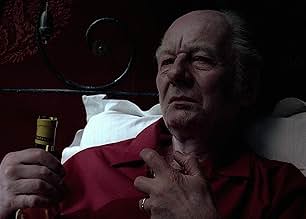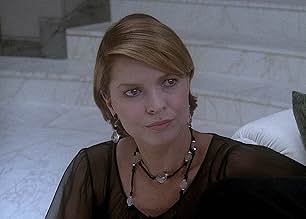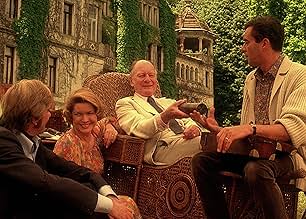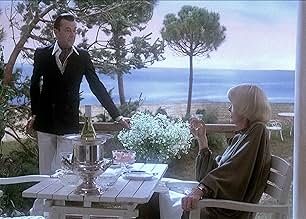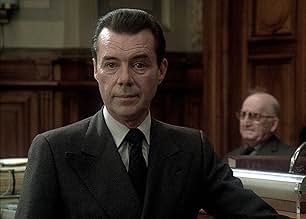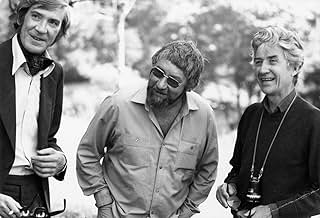IMDb RATING
7.4/10
3.7K
YOUR RATING
A dying writer bases his last book on his own perception of his family.A dying writer bases his last book on his own perception of his family.A dying writer bases his last book on his own perception of his family.
- Awards
- 11 wins & 2 nominations total
Denis Lawson
- Dave Woodford
- (as Dennis Lawson)
- Director
- Writer
- All cast & crew
- Production, box office & more at IMDbPro
7.43.7K
1
2
3
4
5
6
7
8
9
10
Featured reviews
A true artistic masterpiece, by a true master of the art
A dying artist, beautifully acted by Fainsilber, struggles to complete one last book before he dies - the plot of which becomes confused with his own troubled life as he thinks and dreams his way through the night. This was the first film in English for master film-maker Alain Resnais, and also happens to be one of his best. Using a variety of surreal cinematic techniques, Resnais is able to capture the characters of everyone in the film perfectly and his style - combined with excellent scripting - makes for an experience that will not be forgotten. Although the first half of the film will probably be spent in confusion, before you actually realise what is going on - I had to see this film several times before I was satisfied - it is worth struggling to understand this complex and thoroughly entertaining artistic movie.
A hilarious trip
This is one of the strangest movies I know. French intellectual aesthete meets contemporary British playwright - this should be the title of Providence. When two completely different cultures meet for a common project, the risk of failure is enormous. But in this case something interestingly and uniquely hilarious was created. Providence is a feverish dream that was successfully created for the screen.
The dream sequences of an old, dying writer, played by John Gielgud are absurd in a very British way. John Gielguds's upper class "king's English" voice-over adds effectively to its strangeness. As usual in contemporary British plays, sex and bowel movements are of the utmost importance . no, the script as a whole is neither very original nor particularly funny. I liked the incongruous, illogical situations though. Every now and then, in the most impossible situations, a strange, sickly looking football player (he seems to have fallen off Monty Python's Flying Circus) jogs limply past.
Director Alain Resnais is responsible for the dreamscapes, and they make Providence worth watching. Real settings are artfully distorted into haunting, surreal spatial sequences. Foreground and background, light and darkness, different textures and beautiful color arrangements are expertly arranged into a world of its own that is never too far from reality. One is sometimes reminded of Magritte's surrealistic paintings. Strange sounds add to the almost psychedelic effect the dream scenes have.
The acting is remarkable, especially Dirk Bogarde as the writer's slick, cynical «dream son» gives an outstanding performance.
The dream sequences of an old, dying writer, played by John Gielgud are absurd in a very British way. John Gielguds's upper class "king's English" voice-over adds effectively to its strangeness. As usual in contemporary British plays, sex and bowel movements are of the utmost importance . no, the script as a whole is neither very original nor particularly funny. I liked the incongruous, illogical situations though. Every now and then, in the most impossible situations, a strange, sickly looking football player (he seems to have fallen off Monty Python's Flying Circus) jogs limply past.
Director Alain Resnais is responsible for the dreamscapes, and they make Providence worth watching. Real settings are artfully distorted into haunting, surreal spatial sequences. Foreground and background, light and darkness, different textures and beautiful color arrangements are expertly arranged into a world of its own that is never too far from reality. One is sometimes reminded of Magritte's surrealistic paintings. Strange sounds add to the almost psychedelic effect the dream scenes have.
The acting is remarkable, especially Dirk Bogarde as the writer's slick, cynical «dream son» gives an outstanding performance.
In Vino Veritas
Since so many good comments have been written here, mostly on the psychological side of the characters, and they are all excellent, I decided to comment upon a very present entity and that is WINE.
Notice that, until the last scene, everybody drinks white, mostly CHABLIS, an acid one. But on that last scene Resnais shifts to RED. It is no accident, it has in my modest opinion, a way that illustrates a very fundamental change in the feelings that occurred in that lunch.
Criticism and over-analysis, ever present till that event, give way to peaceful acceptance of the characters by the father, Without hypocrite sensibility, that he refuses, but with warmth and tolerance.
Well, I do believe, by some 55 years of experience, that white wine (dry, European style) makes one restless and sometimes bitter.
Red wine makes one more relaxed and happy.
I do not know which kind of wine Resnais prefers, but since he is a Breton I would not be surprised, that it is WHITE. Maybe that is the reason why His movies are so difficult to decode. They are also some of the most magnificent works of cinematic art..
Notice that, until the last scene, everybody drinks white, mostly CHABLIS, an acid one. But on that last scene Resnais shifts to RED. It is no accident, it has in my modest opinion, a way that illustrates a very fundamental change in the feelings that occurred in that lunch.
Criticism and over-analysis, ever present till that event, give way to peaceful acceptance of the characters by the father, Without hypocrite sensibility, that he refuses, but with warmth and tolerance.
Well, I do believe, by some 55 years of experience, that white wine (dry, European style) makes one restless and sometimes bitter.
Red wine makes one more relaxed and happy.
I do not know which kind of wine Resnais prefers, but since he is a Breton I would not be surprised, that it is WHITE. Maybe that is the reason why His movies are so difficult to decode. They are also some of the most magnificent works of cinematic art..
10jfb-4
A blazing masterpiece
Don't be put off by what people (including lovers of the film) say about its initially being confusing. Even the first time through, it is madly enjoyable second by second, and it needn't take long to figure out what is going on. In fact, once you know that we are into a dying man's dreams/fantasies/wishes regarding his own family, you have all you need to make sense of virtually everything straight off. By the end, everything has locked into place in a most satisfying way. The contrast between the man's dreams about his family and what you see when they appear in person near the end is one of the most delicious things in the whole of art.
A cold, intelligent exercise in the art of film making.
Renais "Providence" has all the hallmarks of cinema at its artistic best. Every component of film making is expertly handled. David Mercer's literary screenplay is a joy to listen to, especially when delivered by the likes of Dirk Bogarde and of course the legendary John Gielgud. The visuals are haunting and perfectly shot with detailed attention to set and costume. Miklos Rosza's soundtrack is in total accordance with the work as a whole, never intrusive, while adding to the rich tapestry that is "Providence". Renais too has assembled a wonderful if somewhat odd cast, which suitably serve this somewhat odd film.
Gielgud plays a dying author whose mind is racing with fantasies peopled by members of his family. His character Clive Langham is depicted as a ribald, sensual, womanizer. Yet his fantasies, making up the bulk of the film, are curiously cold and stark. They are played in bleak settings with an ever present sense of impending catastrophe, though remaining totally devoid of emotion. These imaginings are at completely at odds with their creator. The extreme incongruousness of these fantasies with the character to whom they belong, remains a mystery. This detracts much in the way of emotional impact which is very much lacking in the film, whether intentional or not. The elimination of emotion leaves "Providence" a cold, wonderfully intelligent exercise in the art of film making.
Renais has assembled an intriguing cast headed by the superb Gielgud. Dirk Bogarde whose performances have often been tinged with a cold, sauve superciliousness brings this unpleasant quality to an unparalleled level of extremity. Even the usually over emoting Ellen Burstyn delivers a restrained performance. Elaine Stritch has to be the oddest choice for the role being so contrary to her well known persona. Never has a more unlikely coupling been presented than Stitch and Bogarde as lovers. Yet in this emotionless void, even that becomes acceptable.
"Providence" is a highly unusual, important film and shouldn't be missed by the discerning film enthusiast. Yet despite the wealth of cinematic craft on display it remains an unsatisfying experience.
Gielgud plays a dying author whose mind is racing with fantasies peopled by members of his family. His character Clive Langham is depicted as a ribald, sensual, womanizer. Yet his fantasies, making up the bulk of the film, are curiously cold and stark. They are played in bleak settings with an ever present sense of impending catastrophe, though remaining totally devoid of emotion. These imaginings are at completely at odds with their creator. The extreme incongruousness of these fantasies with the character to whom they belong, remains a mystery. This detracts much in the way of emotional impact which is very much lacking in the film, whether intentional or not. The elimination of emotion leaves "Providence" a cold, wonderfully intelligent exercise in the art of film making.
Renais has assembled an intriguing cast headed by the superb Gielgud. Dirk Bogarde whose performances have often been tinged with a cold, sauve superciliousness brings this unpleasant quality to an unparalleled level of extremity. Even the usually over emoting Ellen Burstyn delivers a restrained performance. Elaine Stritch has to be the oddest choice for the role being so contrary to her well known persona. Never has a more unlikely coupling been presented than Stitch and Bogarde as lovers. Yet in this emotionless void, even that becomes acceptable.
"Providence" is a highly unusual, important film and shouldn't be missed by the discerning film enthusiast. Yet despite the wealth of cinematic craft on display it remains an unsatisfying experience.
Did you know
- TriviaSir John Gielgud, who spent most of his career on the stage, considered this movie and the television mini-series Brideshead Revisited (1981) to be his only two screen appearances of which he was genuinely proud.
- Quotes
Clive Langham: Don't you think to have only one bastard after sixty years of action is almost tantamount to self denial?
- Crazy creditsThe National Philharmonic Orchestra is misspelled as National Philarmonic Orchestra in the opening credits.
- ConnectionsFeatured in Zomergasten: Episode #7.4 (1994)
Details
- Runtime
- 1h 44m(104 min)
- Color
- Aspect ratio
- 1.78 : 1(original ratio)
Contribute to this page
Suggest an edit or add missing content

